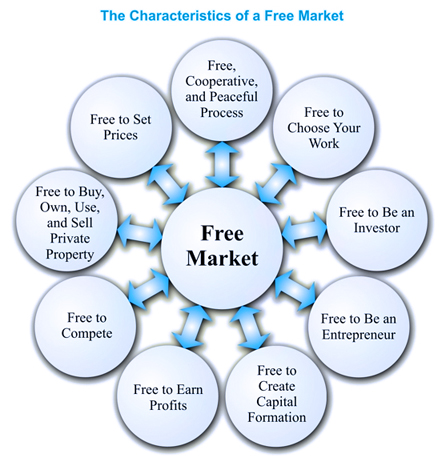The Free Market and Collective Liberty
I was surprised to see how tepid John Stuart Mill was in championing the free market as a contribution to liberty. To understand the following passage from On Liberty “Chapter V: Applications,” paragraph 4, remember that according to 19th century custom, he used the phrase “free trade” to mean not just free international trade, but all of what we would call the free market. Indeed, in the justifiably replace the phrase “free trade” by “the free market” and the word “trade” in every other instance by “the market”:
Again, trade is a social act. Whoever undertakes to sell any description of goods to the public, does what affects the interest of other persons, and of society in general; and thus his conduct, in principle, comes within the jurisdiction of society: accordingly, it was once held to be the duty of governments, in all cases which were considered of importance, to fix prices, and regulate the processes of manufacture. But it is now recognised, though not till after a long struggle, that both the cheapness and the good quality of commodities are most effectually provided for by leaving the producers and sellers perfectly free, under the sole check of equal freedom to the buyers for supplying themselves elsewhere. This is the so-called doctrine of Free Trade, which rests on grounds different from, though equally solid with, the principle of individual liberty asserted in this Essay. Restrictions on trade, or on production for purposes of trade, are indeed restraints; and all restraint, quâ restraint, is an evil: but the restraints in question affect only that part of conduct which society is competent to restrain, and are wrong solely because they do not really produce the results which it is desired to produce by them. As the principle of individual liberty is not involved in the doctrine of Free Trade, so neither is it in most of the questions which arise respecting the limits of that doctrine; as for example, what amount of public control is admissible for the prevention of fraud by adulteration; how far sanitary precautions, or arrangements to protect workpeople employed in dangerous occupations, should be enforced on employers. Such questions involve considerations of liberty, only in so far as leaving people to themselves is always better, cæteris paribus, than controlling them: but that they may be legitimately controlled for these ends, is in principle undeniable. On the other hand, there are questions relating to interference with trade, which are essentially questions of liberty; such as the Maine Law, already touched upon; the prohibition of the importation of opium into China; the restriction of the sale of poisons; all cases, in short, where the object of the interference is to make it impossible or difficult to obtain a particular commodity. These interferences are objectionable, not as infringements on the liberty of the producer or seller, but on that of the buyer.
Whenever a market exchange is fully voluntary and well-informed on the part of all parties involved in the transaction, it seems to me an abridgment of the collective liberty of that group of people involved to interfere with that exchange. And I think this abridgment of liberty rises above the level of John Stuart Mill’s concession “all restraint, quâ restraint, is an evil.” In sexual matters we recognize the importance of the liberty of two people eager to engage in an activity together to be able to engage in that activity. Why should the liberty of two people eager to engage in a market transaction be any different?
Just as there is sometimes sufficient reason to limit an individual’s liberty in order to prevent that individual from harming someone else, there may sometimes be sufficient reason to interfere in a fully voluntary, well-informed market transaction (including other selves or time slices of the individuals involved viewed as a special case of “someone else”). But it makes no sense to me to deny that this is done at the cost of the collective liberty of the group of individuals who want to engage in a market transaction.
Let me go further and say that the collective liberty argument for economic freedom should often trump Federalism. The “interstate commerce” clause of the constitution has been used to justify a great deal of interference in the free market. A much more appropriate use of the interstate commerce clause would be federal laws limiting how much states can interfere in the free market. I have written many times and hosted many guest posts about the evil (and I choose that word carefully) of excessive licensing requirement:
- When the Government Says “You May Not Have a Job”
- Magic Ingredient 1: More K-12 School
- “Keep the Riffraff Out!”
- Jobs
- Persuasion
- The Magic of Etch-a-Sketch: A Supply-Side Liberal Fantasy
- Robert L. Woodson Sr. on Helping the Poor
- Edward L. Kimball: Civil Disobedience
- Uwe Reinhardt: Does Occupational Licensing Deserve Our Approval? A Review of Work by Morris Kleiner
- Robert Graboyes on Enabling Supply-Side Innovation in Health Care
- Clay Christensen, Jeffrey Flier and Vineeta Vijayaraghavan on How to Make Health Care More Cost Effective
I have heard many people say “But occupational licensing is a state issue–the federal government can’t do much about it.” The federal government can do many things with its interstate commerce power; stopping lobbyists at the state level from convincing state legislators to unduly restrict the free market is an excellent way to foster interstate commerce.
Similarly, federal laws to restrain the use of rent control and to prevent undue limitations on residential construction could do a lot of good in ways that can legitimately be seen as fostering interstate commerce. When federalism or “states’ rights” and the most central free market principles come in conflict, I choose the free market. And in choosing the free market, I am choosing an important dimension of liberty.
